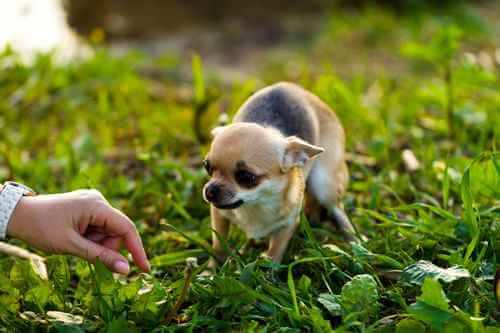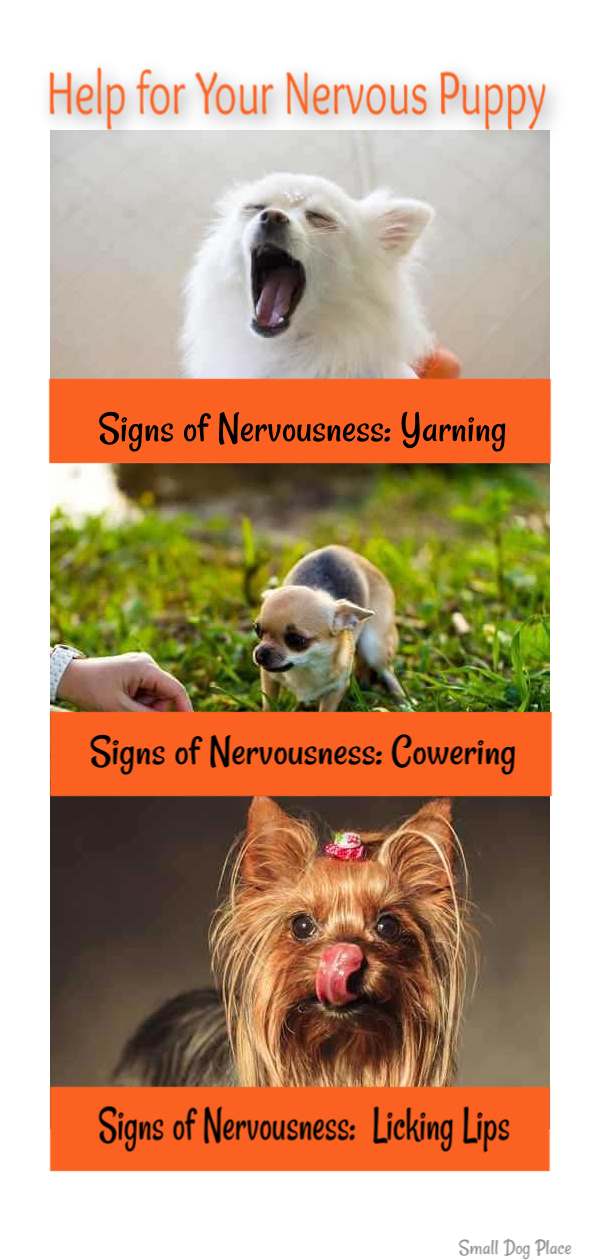- Small Dog Place Home
- Emotional Problems
- nervous dog or puppy
Nervous Dog or Puppy Woes?
How to Deal With Your Puppy’s Nervousness
By Susan Combs |Last Updated 04-25-2024
Dealing with a nervous dog or puppy isn't easy. Shy pups fall into this category also. Nervousness is a trait that’s usually inherited by the parents. However, there are other common reasons why your dog might be nervous.
For example, if your dog was adopted and has experienced a previous bad experience or trauma, those experiences can stay with them.
Sickness or separation anxiety (from previous owners) can also trigger nervousness in puppies and dogs. Fortunately, there are several ways you can deal with this.
 A nervous dog or puppy will often cower with tail tucked between their legs.
A nervous dog or puppy will often cower with tail tucked between their legs.Signs of a Nervous Dog or Puppy
One of the first things you’ll want to do is know how to identify signs of a nervous dog.
Early signs can be very subtle and easily slip under the radar. But, knowing a little bit about puppy body language will give you clues to how he's feeling.
For example, they may lick their lips often, hide more than usual, or look away even when you talk to them. However, you may be able to notice more obvious signs if their nervousness progresses.
For example, if they pant, cower, and tuck their tails between their legs, or run away from you, chances are they’re shy and nervous.
Puppies who yawn may not be tired at all. Another sign that you have an anxious puppy on your hands so to notice frequent yawning. Yawning is the puppy's way of calming himself.
Occasionally, a very nervous dog or puppy will avoid contact with you or other people completely. This is a more serious case and will require patience on your part.
Does Your Dog or Puppy Show These Signs?
- Lick lips
- No eye contact
- Pant
- Hide
- Cower
- Tremble
- Tails tucked between the legs
- Yawning
- Avoid contact with you
 A nervous dog or puppy is showing signs of anxiety by yawning
A nervous dog or puppy is showing signs of anxiety by yawning A nervous dog or puppy might let us know by licking their lips.
A nervous dog or puppy might let us know by licking their lips. Refusing to make eye contact is another sign of nervousness in dogs.
Refusing to make eye contact is another sign of nervousness in dogs.How We May Be Contributing to the Problem
It's heart-wrenching for a well-meaning dog parent to even consider the possibility that we may be part of the problem.
There may be things that we do automatically, without thinking that create even more anxiety in an already nervous dog or puppy.
How Your Mood and Behavior Affect Your Dog
Dogs are very smart animals, and they pick up on the mood and behavior of others around them. After all, a stressful and tense environment can make any puppy nervous. (And People Too).
Although they don’t understand what makes their owners angry or withdrawn, they will react in a way that feels appropriate to them, and nervousness is a natural reaction.
On a day to day basis, understand that dogs are intuitive. If you’re having a bad day, be aware of how your behavior affects your puppy.
Provide them with words of affirmation, and try to steer away from being visibly upset around them—just as you would with a toddler.
You wouldn’t argue on the phone with a child watching you, and you shouldn’t want to do that with a puppy nearby, either.
Yelling and Punishment Make Things Worse
It’s critical that you don’t punish them for nervous behavior. For instance, if you notice them tucking their tail between their legs (for seemingly no reason), yelling at them and punishing them will only intensify the problem.
They could become afraid of your aggression, and associate it with their behaviors. Worse, because small dogs are still learning, they could react negatively by biting.
Some breeds are more sensitive than others and even within breeds, there will always be individual puppies that cower at the drop of a hat.
Harsh Training Methods
Most of today's puppy parents know that positive training methods work better than the older punitive techniques of generations past.
Lots of patience and tasty treats make training easier and the bond you develop will help calm anxious puppies.
Now that we have discussed all the things Not To Do, let's look at some things that you can do to help your nervous dog or puppy.
Things You Can do Now to help Your Shy or Nervous Puppy
Exercise Regularly
Exercise is one of the best stress relievers for dogs. Similarly to humans, exercise releases serotonin and relieves tension.
In addition to taking them for regular walks, take them to the park and play a game of catch or chase with them.
Get them running and having fun. It would be best if you also started rewarding them for simple behaviors when they come out of their shell and aren’t so nervous.
Socialize
Your dog should practice being around other dogs and people, too. Treat dogs like the social creatures they are. Take them to the dog park or link up with other dog owners for a puppy playdate.
If you don’t know anyone, research local groups on Meetup.com or Facebook. Chances are, there are dog owners in your area who are happy to meet. Socialization is very important from an early age, but it's never too late to start.
Use Herbs, Supplements & Oils
Herbal supplements and oils can be a great way to help calm your puppy’s nerves. For example, there’s a handful of essential oils for dogs that have a multitude of benefits.
Lavender works great for separation anxiety, cedarwood is excellent for flea and tick control, and valor has many therapeutic properties.
CBD for Anxiety
You could also give them CBD treats from companies like Plantacea. Although many vets won’t suggest giving CBD to dogs, just because cannabis isn’t legal on a federal level, multiple studies have proven the immense benefits of CBD for both animals and humans.
Dr. Cornelia Wagner, who runs a veterinarian clinic in Portland, recommends slowly introducing CBD to dogs with nervous behavior.
“The upper dose limit for CBD products recommended is around 1 mg/kg/day orally, but one should start with a much smaller fraction of this dose such as 0.05 mg/kg/day,” Dr. Wagner says. “For THC products, start with an oral dose of 0.1-0.25 mg/kg THC once or twice daily.”
If you live an area where cannabis is legal, you’ll find many infused dog treat snacks at local dispensaries as well. Always do your research to make the most educated decision possible.
Work With Dog Trainer or Behaviorist
As a dog owner, you can’t always do everything on your own. If you notice that your dog is nervous, bring in a dog trainer or dog behavior specialist to work with your dog.
These individuals are skilled at using positive reinforcement, socialization, and other vital tricks to help your dog become better on a daily basis.
Keep in mind that most trainers will tell you that while a dog who has experienced previous trauma won’t become cured of nervousness, it will be much easier to manage, and better for your dog’s lifestyle.
Susan Combs is a Pet Health and Safety expert. Her specialties include keeping up with important issues regarding pet health and pet care, working closely with pet parents to find answers concerning training, grooming and caring for specific breeds of dogs.
This article is accurate and true to the best of the author’s knowledge. No advice on this website is meant to substitute for a diagnosis, treatment or advice from a veterinarian. Dogs showing symptoms of distress or illness should be seen by a veterinarian immediately.
About Janice (author and voice behind this site)
Janice Jones has lived with dogs and cats for most of her life and worked as a veterinary technician for over a decade. She has also been a small-breed dog breeder and rescue advocate and holds academic training in psychology, biology, nursing, and mental health counseling. Her work focuses on helping dog owners make informed, responsible decisions rooted in experience, education, and compassion.
When not writing, reading, or researching dog-related topics, she likes to spend time with her six Shih Tzu dogs, her husband, and her family, as well as knitting and crocheting. She is also the voice behind Miracle Shih Tzu and Smart-Knit-Crocheting
Does This Article Deserve Your Thumbs Up?
We always appreciate your support and encouragement. Your thumbs up means so much to us. Please like this article.
If you find this page or any page on Small Dog Place Helpful, or useful in anyway, I'd love it if you would click the small heart found on the bottom right of each page.
You can also share or bookmark this page -- just click on the:

Free Monthly Newsletter
Sign Up for Our Free Newsletter and get our Free Gift to You.
my E-book, The Top 10 Mistakes People Make When Choosing a Dog (and how to avoid them)


